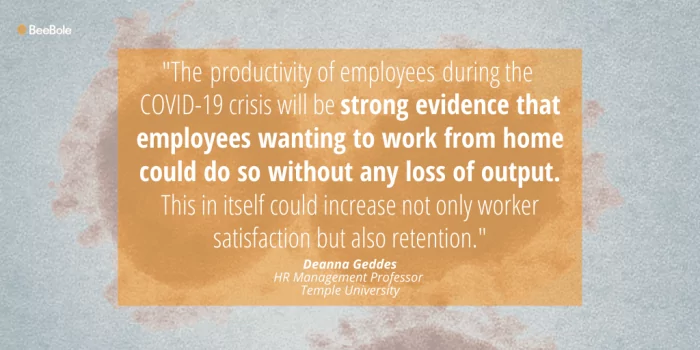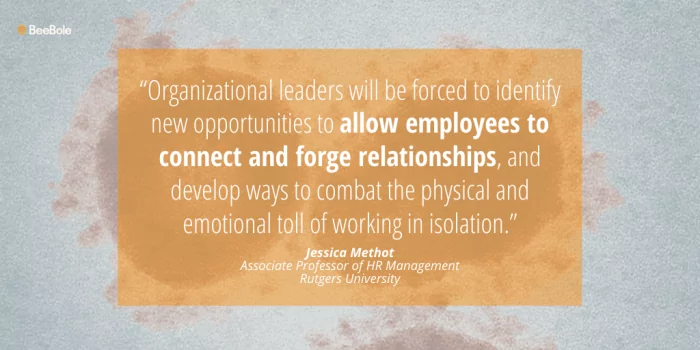Coronavirus and the future of the workplace: 8 trends to watch


Uncertainty is one of the defining traits of the current coronavirus crisis. We still don’t know how this virus works, and our assessment of the future changes by the day. Despite this, one idea is gaining broad consensus: our lives will probably change forever and, thus, so will the way we work.
When it comes to the workplace, it’s easy to foresee a future where remote work will flourish like never before. After all, during the current crisis, remote work has guaranteed the survival of millions of companies around the world.
But… what trends can we expect to see in the workplace after the novel coronavirus?
We asked this question to several experts.
By mid-April, more than 20 million jobs had been lost in the United States alone. In the blink of an eye, the coronavirus crisis and the possibility of a recession have created an enormous sense of vulnerability among the global workforce.
The impact of this crisis is so big that some are already suggesting we drastically change the foundations of our systems and organizations. “We need a new social contract. This crisis is showing the cracks in our world; if people are vulnerable, then the economy is vulnerable,” argues Sharan Burrow, General Secretary of the International Trade Union Confederation.
Does that mean that we have to completely change the way we do business? Is this the end of capitalism as we know it? Probably not. However, we are going to need to make permanent changes in business processes.
We have to be ready for “a world in which we are more flexible, more resilient, for example, in our supply chains. We may need to be more nimble in how we work and governments certainly need to be more proactive in their surveillance and preparation,” stated Vijay Vaitheeswaran, US Business Editor for The Economist, in a recent episode of Money Talks, a podcast by The Economist Radio.
In other words, we’ll need a new mindset if we want to thrive in the post-pandemic era. Such a mindset will affect every aspect of our lives, including how we conceive our workplace.
Let’s take a look at 8 trends brought about by the coronavirus pandemic that will shape the future of work according to the experts.
Flexible working was already a trend before the coronavirus. As stated by Jessica Methot, Associate Professor of Human Resource Management at Rutgers University, “we were already watching trends toward distributed work arrangements, gig work, and flexible work schedules.” The current crisis will simply accelerate the growth of all those flexible working trends.

While there’s little doubt that flexible working will continue to gain acceptance, the question is how fast it will grow. Much of that will depend on its perceived benefits for companies after the current crisis. According to Deanna Geddes, Human Resources Management Professor at Temple University, “the productivity of employees during the COVID-19 crisis will be strong evidence that employees wanting to work from home could do so without any loss of output. This in itself could increase not only worker satisfaction but also retention.”
Although working from home has grown exponentially in the last years, many companies have been reluctant to adopt it. This crisis, however, has taught us that the smart companies of tomorrow will need to adopt some form of remote work if they want to effectively face future pandemics.
Professors Stewart Friendman, from the University of Pennsylvania, and Alyssa Westring, from DePaul University, believe the current scenario could lead to more acceptance of remote work. “We expect that this period of widespread remote work will enable leaders and employers to understand the variety of circumstances under which remote work can be effective and to implement it accordingly,” argue these scholars and authors of the book Parents Who Lead.
Similarly, Prithwiraj Choudhury, Associate Professor of Business Administration at Harvard University, feels that once the crisis is over, more workers might start exploring and demanding remote work arrangements.
“While the crisis is not a good phase to evaluate this trend and many workers work from home under great constraints, some workers are experiencing the benefits of flexibility for the first time and might continue to look for the same,” states Professor Choudhury. Indeed, employees who start to work remotely can manage a work-life balance in ways that were not possible from their cubicles.
Companies will have to build a better foundation for remote work. This will not only involve technical support and solutions but also coming up with guidelines, policies, and a legal framework capable of covering basic rights for remote workers.
Likewise, Professors Friendman and Westring expect to see a greater acknowledgment of the contributions of essential hourly employees (e.g., grocery store workers), front line workers (e.g., nurses), and educators. “We expect a societal shift towards an appreciation of these employees and hope that their efforts are rewarded with greater recognition, compensation, sick leave, and other benefits.”
At the same time, more and more companies will treat remote work as an opportunity for cutting costs. According to Professor Prithwiraj Choudhury, “businesses, especially CFOs, might realize that there are significant real estate cost savings in transitioning staff from offices to remote work and they might continue to encourage remote work arrangements to trim down the balance sheet.”
Thomas Lee, Professor of Management at the University of Washington, also believes that with greater and lasting use of telecommuting, “companies will lessen their demand for office space and facilities (e.g., lease or rent less space).”
Technology is the engine of remote work, and right now workers are forced to use it to stay productive. We have no choice, and “this may become a permanent way of life and represent a much broader shift that could have bigger implications going forward,” argues Vijay Vaitheeswaran.
In the near future, technology will probably reduce the amount of business travel and corporate conferences. In fact, Vijay Vaitheeswaran foresees companies deciding that they don’t need those conferences and instead channeling their money to other forms of online interactions.
Along those lines, Professor Thomas Lee predicts greater and lasting use of online interactions in teams (e.g., task forces, standing committees, and even one-time meetings). We would also expect e-learning platforms to play a big role in replacing training-related events and conferences.
The development of workplaces around the idea of well-being has gained force in recent years. This crisis is further reason for companies to move in that direction.
Now that people are working from home, companies are realizing that empowering employees, establishing good communication, providing flexibility, and fomenting trust go a long way in terms of engagement and commitment.
In a recent article written by Dina Gerdeman, a senior writer at Harvard Business School Working Knowledge, about the coronavirus crisis and the future of business, Michael Beer, Professor of Business Administration at Harvard, highlights the current crisis as a great opportunity for senior management to rapidly develop a trust-based culture.
Similarly, Rosabeth M. Kanter, Professor of Business Administration at Harvard, expects good leadership coming from managers willing to focus on improving workplace culture. “Renewing and reinforcing good workplace practices can make a big difference to productivity as well as well-being,” states Professor Kanter.
Once this crisis is over, we will see more companies prioritizing well-being as part of their work culture. In fact, many of the upcoming changes in the corporate world will probably be guided by the idea of creating a healthy work environment that reduces stress by listening to and empowering employees.
Although the costs of presenteeism are enormous for companies, a big chunk of the corporate world is still indifferent towards this phenomenon. There are millions of “good soldiers” out there who choose to go to work even when they are sick.
After the 2008 financial crisis, fears and uncertainty about the future encouraged this toxic behavior in employees. This, unfortunately, was further validated by a corporate culture that favors attendance and productivity over well-being.
However, this rationale has lost its appeal. Because of the health-related nature of the current crisis, we expect to see companies devoting more attention and resources to tackling presenteeism and encouraging employees to stay at home when they feel sick.
On Money Talks, Vijay Vaitheeswaran reminded us of something quite simple: “crisis also breeds innovation.” Indeed, he believes that “we might see entirely new business models emerge” after the coronavirus pandemic. That could also be true for the workplace, especially if working remotely becomes the new norm, as suggested above.
According to Professor Jessica Methot, environments dominated by remote work pose the risk of sacrificing “much of the social aspect that defines the workplace, and our identities.” Her research demonstrates the benefits of close friendships with coworkers for our work performance.

Because of that, she thinks that “organizational leaders will be forced to identify new opportunities to allow employees to connect and forge relationships, and develop ways to combat the physical and emotional toll of working in isolation.” Challenges like this will certainly generate lots of thinking about how to better shape the workplace.
If the workplace becomes more virtual and remote, companies will need to rethink how they evaluate and measure the performance of their employees. Professor Thomas Lee believes that the future evaluation of work will need to have “a greater focus on countable and more tangible work output (e.g. reports, sales, software codes, etc.) and less on “process” (e.g. teamwork, helping others).”
An increase in video conferencing in the workplace will force people to learn a whole new set of skills that go beyond technical know-how. For instance, people in charge of face-to-face negotiations will need to learn how to work effectively in a more virtual environment.
Negotiators who aren’t capable of adapting will find themselves at a disadvantage. “If you don’t think consciously about how virtual interaction differs from in-person negotiation then you are likely to be less effective as a negotiator than others who are adjusting their approach, style, and strategy. And that risks putting you at a disadvantage,” argues Bruce Barry, Professor of Management at Vanderbilt University.
In other words, companies will invest more time in strategies and styles aimed at closing deals in the “virtual”, or rather, online world.
—
We believe these 8 trends will play a big role in the future of work, as will the shift to the so-called augmented workforce. However, as noted above, the coronavirus crisis and its effects are still surrounded by a high degree of uncertainty. Shane Greenstein, Professor of Business Administration at Harvard University, summarizes this dilemma with the following question:
“Many firms experience tension between temporary experiment and permanent alternation in processes. So many changes are forced on firms reluctantly. So many workers have seen their daily schedules redirected. What parts of those changes will stay in place after the coronavirus crisis passes?”
Do you agree with this depiction of the future of the workplace triggered by coronavirus? We’d like to know your opinion and the approach at your organization, so please share in the comments below. In the meantime, stay safe!
—
Photos by Erik Mclean and CDC on Unsplash
[What’s in this post: HR expert Suzanne Lucas is well-known for her blog the Evil HR Lady, and she’s an expert when it comes to matters of the people. That’s precisely why we asked her to lead this webinar on Employee Time Tracking and Analytics—be sure to watch it entirely, with plenty of tried and […]
A business’ greatest assets walk out the door every evening (or log off their computers in a remote-forward world). At some point in your life, you have probably heard this old business adage. For service-based businesses, this is not a metaphor; it’s the truth. So what does this mean when it comes to choosing KPIs […]
Discover the Hidden Traps of Employee Monitoring and Master the Art of Balancing Trust and Productivity. Learn how to avoid the common pitfalls of employee monitoring while understanding the crucial distinction between employee monitoring and time tracking. Uncover practical strategies to foster a culture of transparency, engagement, and respect in the workplace, ensuring harmony between employer objectives and employee privacy. Empower your organization with effective monitoring practices that boost productivity without sacrificing trust or morale. Dive into our comprehensive guide now.
It’s already happening. https://www.cnbc.com/2020/05/21/zuckerberg-50percent-of-facebook-employees-could-be-working-remotely.html
Thanks for your comment (and for reading!), Stu. Indeed, it’s a trend we’re already starting to see, even in some really large companies. It will interesting to see where the workplace is even six months from now.